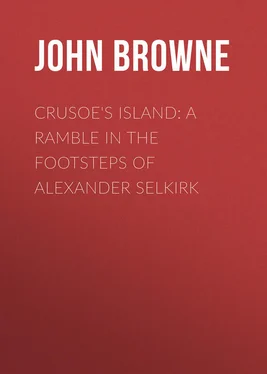John Browne - Crusoe's Island - A Ramble in the Footsteps of Alexander Selkirk
Здесь есть возможность читать онлайн «John Browne - Crusoe's Island - A Ramble in the Footsteps of Alexander Selkirk» — ознакомительный отрывок электронной книги совершенно бесплатно, а после прочтения отрывка купить полную версию. В некоторых случаях можно слушать аудио, скачать через торрент в формате fb2 и присутствует краткое содержание. Издательство: Иностранный паблик, Жанр: foreign_antique, foreign_prose, на английском языке. Описание произведения, (предисловие) а так же отзывы посетителей доступны на портале библиотеки ЛибКат.
- Название:Crusoe's Island: A Ramble in the Footsteps of Alexander Selkirk
- Автор:
- Издательство:Иностранный паблик
- Жанр:
- Год:неизвестен
- ISBN:нет данных
- Рейтинг книги:3 / 5. Голосов: 1
-
Избранное:Добавить в избранное
- Отзывы:
-
Ваша оценка:
- 60
- 1
- 2
- 3
- 4
- 5
Crusoe's Island: A Ramble in the Footsteps of Alexander Selkirk: краткое содержание, описание и аннотация
Предлагаем к чтению аннотацию, описание, краткое содержание или предисловие (зависит от того, что написал сам автор книги «Crusoe's Island: A Ramble in the Footsteps of Alexander Selkirk»). Если вы не нашли необходимую информацию о книге — напишите в комментариях, мы постараемся отыскать её.
Crusoe's Island: A Ramble in the Footsteps of Alexander Selkirk — читать онлайн ознакомительный отрывок
Ниже представлен текст книги, разбитый по страницам. Система сохранения места последней прочитанной страницы, позволяет с удобством читать онлайн бесплатно книгу «Crusoe's Island: A Ramble in the Footsteps of Alexander Selkirk», без необходимости каждый раз заново искать на чём Вы остановились. Поставьте закладку, и сможете в любой момент перейти на страницу, на которой закончили чтение.
Интервал:
Закладка:
These cells are dug into the brow of a hill, facing the harbor, and extend underground to the distance of several hundred feet, in the form of passages and vaults, resembling somewhat the Catacombs of Rome. During the penal settlement established here by the Chilian government, the convicts, numbering sometimes many hundreds, were confined in these gloomy dungeons, where they were subjected to the most barbarous treatment. The gates or doors by which the entrances were secured had all been torn down and destroyed, and the excavations were now occupied by wild goats, bats, toads, and different sorts of vermin. Rank fern hung upon the sides; overhead was dripping with a cold and deathlike sweat, and slimy drops coursed down the weeds, and the air was damp and chilly; thick darkness was within in the depths beyond – darkness that no wandering gleam from the light of day ever reached, for heaven never smiled upon those dreary abodes of sin and sorrow. A few of the inner dungeons, for the worst criminals, were dug still deeper underground, and rough stairways of earth led down into them, which were shut out from the upper vaults by strong doors. The size of these lower dungeons was not more than five or six feet in length by four or five in height, from which some idea may be formed of the sufferings endured by the poor wretches confined in them, shut out from the light of heaven, loaded with heavy irons, crushed down by dank and impenetrable walls of earth, starved and beaten by their cruel guards, with no living soul to pity them in their woe, no hope of release save in death. We saw, by the aid of a torch, deep holes scratched in one of the walls, bearing the impression of human fingers. It might have been that some unhappy murderer, goaded to madness by such cruel tortures of body and terrible anguish of mind as drive men to tear even their own flesh when buried before the vital spark is extinct, had grasped out the earth in his desperation, and left the marks in his death agonies upon the clay that entombed him, to tell what no human heart but his had suffered there, no human ear had heard, no human eye had witnessed. The deep, startling echo breaking upon the heavy air, as we sounded the walls, seemed yet to mingle with his curses, and its last sepulchral throb was like the dying moan of the maniac.
Some time before the great earthquake, which destroyed the fortifications and broke up the penal colony, a gang of convicts, amounting to three hundred, succeeded in liberating themselves from their cells. Unable to endure the cruelties inflicted upon them, they broke loose from their chains, and, rushing upon the guards, murdered the greater part of them, and finally seized the garrison. For several days they held complete possession of the island. A whale-ship, belonging to Nantucket, happening to come in at the time for wood and water, they seized the captain, and compelled him to take on board as many of them as the vessel could contain. About two hundred were put on board. They then threatened the captain and officers with instant death in case of any failure to land them on the coast of Peru, whither they determined to go in order to escape the vengeance of the Chilian government. Desirous of getting rid of them as soon as possible, the captain of the whaler ran over for the first land on the coast of Chili, where he put them ashore, leaving them ignorant of their position until they were unable to regain the vessel. They soon discovered that they were only thirty miles from Valparaiso; but, short as the distance was from the Chilian authorities, they evaded all attempts to capture them, and eventually joined the Peruvian army, which was then advancing upon Santiago. The remainder of the prisoners left upon the island escaped in different vessels, and were scattered over various parts of the world. Only a few of the entire number engaged in the massacre were ever captured; sentence of death was passed upon them, and they were shot in the public plaza of Santiago.
Turning our steps toward the settlement of the present residents, we passed a few hours very agreeably in rambling about among their rustic abodes. The total number of inhabitants at this period (1849) is sixteen, consisting of William Pearce, an American, and four or five Chilian men, with their wives and children. No others have lived permanently upon the island for several years. There are in all some six or seven huts, pleasantly surrounded by shrubbery, and well supplied with water from a spring. These habitations are built of the straw of wild oats, interwoven through wattles or long sticks, and thatched with the same, and, whether from design or accident, are extremely picturesque. The roofs project so as to form an agreeable shade all round; the doorways are covered in by a sort of projecting porch, in the style of the French cottages along the valley of the Seine; small out-houses, erected upon posts, are scattered about each inclosure; and an air of repose and freedom from worldly care pervades the whole place, though the construction of the houses and mode of living are evidently of the most primitive kind. Seen through the green shrubberies that abound in every direction, the bright yellow of the cottages, and the smoke curling up in the still air, have a very cheerful effect; and the prattling voices of the children, mingled with the lively bleating of the kids, and the various pleasant sounds of domestic life, might well lead one to think that the seclusion of these islanders from the busy world is not without its charms. Small patches of ground, fenced with rude stone walls and brushwood, are attached to each of these primitive abodes; and rustic gateways, overrun with wild and luxuriant vines, open in front. Very little attention, however, appears to be bestowed upon the cultivation of the soil; but it looks rich and productive, and might be made to yield abundant crops by a trifling expenditure of labor. The Chilians have never been distinguished for industry; nor is there any evidence here that they depart from their usual philosophy in taking the world easy. Even the American seemed to have caught the prevailing lethargy, and to be content with as little as possible. Vegetables of various kinds grow abundantly wherever the seeds are thrown, among which I noticed excellent radishes, turnips, beets, cabbages, and onions. Potatoes of a very good quality, though not large, are grown in small quantities; and, regarding the natural productiveness of the earth, there seemed to be no reason why they should not be cultivated in sufficient quantities to supply the demands of vessels touching for supplies, and thereby made a profitable source of revenue to the settlers. The grass and wild oats grow in wonderful luxuriance in all the open spaces, and require little attention; and such is the genial character of the climate, that the cattle, of which there seems to be no lack, find ample food to keep them in good condition both in winter and summer. Fig-trees, bearing excellent figs, and vines of various sorts, flourish luxuriantly on the hill-sides. Of fruits there is quite an abundance in the early part of autumn. The peaches were just out of season when we arrived, but we obtained a few which had been peeled and dried in the sun, and we found them large and of excellent flavor. Many of the valleys abound in natural orchards, which have sprung from the seeds planted there by the early voyagers, especially by Lord Anson, who appeared to have taken more interest in the cultivation and settlement of the island than any previous navigator. The disasters experienced by the vessels of this distinguished adventurer in doubling Cape Horn caused him to make Juan Fernandez a rendezvous for the recruiting of his disabled seamen, and for many months he devoted his attention to the production of such vegetables and fruits as he found useful in promoting their recovery; and having likewise in view the misfortunes and necessities of those who might come after him, he caused to be scattered over the island large quantities of seeds, so that, by their increase, abundance and variety of refreshments might be had by all future voyagers. He also left ashore many different sorts of domestic animals, in order that they might propagate and become general throughout the island, for the benefit of shipwrecked mariners, vessels in distress for provisions, and colonists who might hereafter form a settlement there. The philanthropy and moral greatness of these benevolent acts, from which the author could expect to derive little or no advantage during life, can not be too highly commended. If posthumous gratitude can be regarded as a reward, Lord Anson has a just claim to it. How many lives have been saved; how many weather-worn mariners, bowed down with disease, have been renewed in health and strength; how many unhappy castaways have found food abundantly where all they could expect was a lingering death, and have been sustained in their exile, and restored at last to their friends and kindred, through the unselfish benevolence of this brave and kind-hearted navigator, no written record exists to tell; but there are records graven upon the hearts of men that are read by an omniscient eye – a history of good deeds and their reward, more eloquent than human hand hath written.
Читать дальшеИнтервал:
Закладка:
Похожие книги на «Crusoe's Island: A Ramble in the Footsteps of Alexander Selkirk»
Представляем Вашему вниманию похожие книги на «Crusoe's Island: A Ramble in the Footsteps of Alexander Selkirk» списком для выбора. Мы отобрали схожую по названию и смыслу литературу в надежде предоставить читателям больше вариантов отыскать новые, интересные, ещё непрочитанные произведения.
Обсуждение, отзывы о книге «Crusoe's Island: A Ramble in the Footsteps of Alexander Selkirk» и просто собственные мнения читателей. Оставьте ваши комментарии, напишите, что Вы думаете о произведении, его смысле или главных героях. Укажите что конкретно понравилось, а что нет, и почему Вы так считаете.












